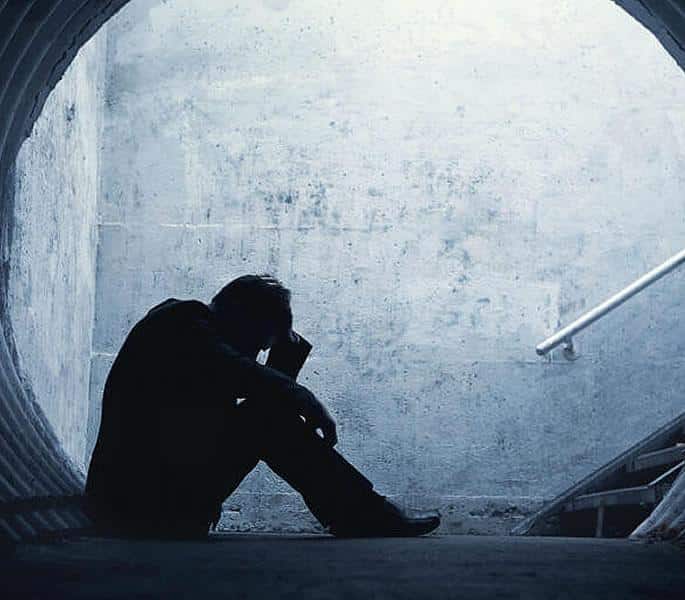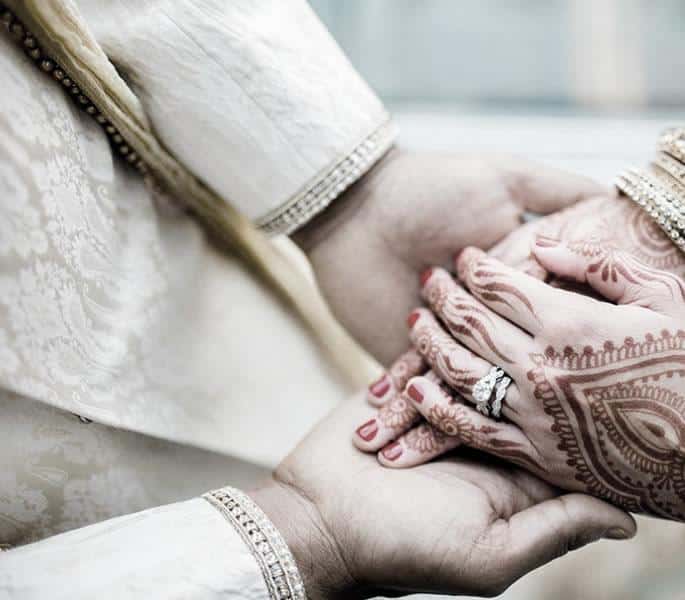"Suffering from bipolar has made it very difficult for me to get married"
He feels depressed, he is anxious and even has panic attacks from time to time. He does not know why this is happening or how. But it is. So, how does a British born South Asian man, admit that these issues are a mental illness?
In the majority of cases, he does not. He does not say anything to anyone and prefers to suffer in silence.
He will mask it as having a low mood, a bad day or just disinterested in things.
He may even laugh it off, act normal and portray he is fine.
But deep down lurks an illness which is destroying him invisibly from the inside. And he just feels helpless because of what is expected of him as a man with South Asian roots.
He does not want to highlight it because of the repercussions on his abilities to cope as an Asian man, who should be strong and capable of being in control.
According to the Men’s Health Forum, in the UK 12.5% of men are suffering from one of the common mental health disorders, which includes Asian men as well.
We take a look at some of the factors that contribute to the denial by many Asian men to accept that they have a mental illness.
Cultural Stronghold
Culturally, Desi men are brought up to be the ‘rock’, the ones with the strength and the centric energy of a relationship or family.
They are supposed to be respected and valued as the dominant sex culturally. Even having a boy is still seen as having the preferred sex of a child.
Men from South Asian communities are not supposed to feel mentally ill or weak to deal with their issues. They are to be seen as strong and in control.
They are supposed to literally have ‘no room’ or ‘time’ for it. It is something that will ‘go away’. Something they do not need to ‘pay attention to’.
Because the more they do, the more of an issue it becomes, which shows weakness and giving in to something which is not seen as a physical injury.
So, basically, they just need to ‘get on with it’ and ‘man up’.
Deepak, aged 29, says:
“I’m the only man in my family and everyone looks up to me. So, when I got depressed after losing my business, I had to keep it together for the family and never got help. Today, I wish I did.”
Being proud and responsible can definitely force Asian men to discount a mental illness like depression as something that is not worth getting the help that it needs.
Most Asian men will not openly talk or discuss their mental health issues with other men because of fear of a verbal backlash or mockery.
Sajid, aged 19, says:
“I’m into fitness and weight training so I look good on the outside.
“But if you tell one of your mates you are feeling depressed or anxious, they will just laugh at you as if you are messing about.
“So, I hide it big time and find it hard to tell anyone.”
Historically, many Desi men will not have seen their elders admitting or showing their mental health problems to their children or grand-children openly.
Being ill especially with a mental illness was an ‘adult thing’ and of no concern to the children in the family.
This kind of a ‘purdah’ was often used to protect younger family members.
Therefore, culturally, such illness was a secret affair and not openly shared. Especially by working-class and non-educated fathers and grandfathers.
Jasmeet, aged 32, says:
“I think my grandad had bad depression but no one ever talked about it or made an issue about it.
“He used to be pretty isolated from the family and sit in the front room alone.
“He never went out much. My mother used to say that’s just the way he is. So, he never got help.”
Hence, growing up young Asian men did not see discussion about mental health among men being the ‘norm’.
As awareness increases, Asian men are realising that mental illnesses have labels such as depression, anxiety, social phobia and bipolar, and that support is available, but many are not ready to admit and talk about their issues and seek professional help.
British South Asian women tend to seek help more than men. And in many cases, men even see mental illness as a ‘female’ problem rather than a universal one.
It’s Not Visible
For the majority, mental illness is not visible. It is not like a physical injury or issue. Therefore, it can go undetected for years.
For most, it is classed as the’ invisible illness’ and many men from South Asian communities prefer to keep it hidden.
However, mental health cannot be separated from physical health. Because mental disorders affect the body both physically and mentally.
Whilst it is easier for Asian men to talk openly about physical ailments a huge stigma exists around being open about any mental illnesses they may have. Also, astoundingly, many will not even talk about it to their loved ones such as spouses and parents.
Those that do talk about their mental issues are often seen as weak and inferior. They can well be ostracised from their circles just because of admitting they have a mental health problem, instead of highlighting their bravery to do so.
They could be mocked, belittles or just simply ignored by fellow men. Mostly because the illness is not visible like a broken leg can.
Such men admitting their issue will most likely be told to ‘man up’ but in a Desi way, which is much harsher and vivid. Mostly programmed into them from earlier generations.
Harsh, a 53-year-old, says:
“Looking back I knew I had mental difficulties from my early years.”
“When I told my father, he just shouted at me and said he could not ‘see anything wrong with me’ and told me to ‘on with it’.
“You simply were not allowed to be mentally ill or admit it, especially to those close to you.”
“I wish I had sought help but explaining it to my family would’ve led to other problems.”
Expectations
A man from a typical Asian family is expected to be in charge of the household. Even in the times of equality, many take on the responsibility naturally because it is an ‘expectation’ of them.
Therefore, it is okay for women in the household who may have mental health issues and get help. But the majority of Asian men will see it as not appropriate to seek help if they have problems.
The pressures and expectations of Asian men themselves can lead to the surge of mental health problems.
Financial, emotional and family support are frequently seen as the duty of the men. Especially, in orthodox Asian households.
So, loss of job or business, relationship breakdowns, loss of family members, problems with children can all contribute to a plethora of mental illness disorders. Depending on what the instigator is.
This ends up in Asian men finding ways to cope without getting formal help medical help in terms of medication or therapy.
A common way is to turn to alcohol or drugs.
According to the Men’s Health Forum, men are about three times more likely to depend on alcohol than women. This is another major problem for South Asian communities.
As many men from South Asian communities with mental health issues will turn to alcohol for escapism. Also, it is a much easier way to mask the real underlying problem.
Sarbjit, aged 36, says:
“I fell into depression after my marriage broke down. I could not bear my family seeing me this way, so instead of getting help, I turned to drink.
“I began to drink in the day and carry on into the night. This numbed my pain and depression, but I was broken and could not admit it.
“Eventually, my nephew forced me to see my doctor, who immediately prescribed medication and therapy.
“If he didn’t help me at that time. I have no idea what would’ve happened by now.”
Marriage
Marriage is a very important part of South Asian life. It is seen as a norm in Asian society. So, what happens if the man suffers from mental health?
For an Asian male to marry late or to marry again after divorce, are all easily accepted. However, if a man who has a mental health issue wants to marry, then things do change.
Most likely, one of two things will happen.
He either will marry not revealing his mental illness to the prospective wife. A familiar trait in arranged marriages.
Or, if he reveals his mental illness, the chances of marrying will be reduced to only someone else who may be in a similar position or is in love with him despite his illness.
The taboo of disabilities including mental health is a major hurdle for South Asian communities when it comes to marriage.
Majority of marital prospects look for the ‘perfect man’ and one with mental health issues, no matter how minor, will be stigmatised immediately.
Hamza, aged 29, says:
“Suffering from bipolar has made it very difficult for me to get married so far.”
“Everything is fine when it comes to meeting prospects either via family or on my own.
“But, as soon as I mention my mental illness, you can tell the conversation does change, no matter how nice the person is still being to you.
“I have no issues otherwise, I have a great family and I am part of the family business.
“My experience of the stigma and reactions towards mental illness from women looking to marry is not without prejudice.”
But it can be said, that Asian women with mental illness will face much more stigma than men.
Stigma of Help
One of the biggest steps forward for anyone suffering from mental health is to first accept there is an issue and then get help for it.
Issues such as sex abuse, domestic violence, alcohol abuse, sexual orientation, drug abuse, financial status and poor relationships can all have an impact on the mental health of Asian men.
For men from South Asian communities even if they know something is wrong with them mentally, taking the next step to seek support is seldom taken.
They would rather suffer in silence than let anyone close know, including family, relatives and friends.
There seems to be a major stigma with seeking help for many Asian men because it spells a kind of ‘weakness’ in them not being able to cope with something they should.
Therefore, a lot of mental health issues have gone by without any kind of treatment, leading to major problems for Asian families with the men in their households.
Awareness of mental health is much greater than the past and support is available for those needing it, especially in terms of medication, psychiatric therapy and psychological counselling.
However, with older Asian generations never getting such help openly, this outlook has seldom been passed onto the following generations, leading to the ‘no need’ for such help ideology.
When compared to getting help for physical issues, seeking help for mental health issues is much lower within the South Asian male population in the UK.
Rajan, aged 37, says:
“My father suffered from long periods of what we called ‘sadness’.
“He was very emotional at times, especially, after he lost his job after working in the same place for 33 years.
“He would get angry at us and refused to see a doctor, and brushed it off as nonsense.”
“But we could see him slowly deteriorating. After ten years, his elder brother forced him to go to see a mental health doctor.
“He was diagnosed with major depression, anxiety and a very unstable state of moods.
“His treatment consisted of anti-depressants and therapy. Although it helped, we feel if he had sought help earlier, it would’ve made a bigger impact.”
Meena, aged 25, says:
“My brother was popular at school, college and even university. He was into sports and enjoyed an active lifestyle.
“However, he had a major accident which affected his ability to do physical exercise again. This led to him putting lots of weight on weight.
“This resulted in him going into deep depression and a very dark place, where he started to drink a lot.
“This was heartwrenching to see but whenever his doctor referred him to get help, he would be reluctant to go to appointments.
“If we offered to take him, he refused and always told us men did not need such help.
“This has led to ups and downs in his life, where he still he resists the help.”
These are some of the key reasons why men from South Asian communities find it hard to admit to having mental health problems. There are many more.
Until they do not accept their state of mind as being an illness which needs help like any other illness, there will continue to be sufferers of issues like depression, anxiety and bipolar within UK’s South Asian community.
If you know of any men suffering in this manner, use whatever mechanisms you have to get help for them. Here are some UK organisations that provide support for men suffering from mental health issues.
CALM – a mental health support organisation targeting men. Phone: 0800 58 58 58 (daily, 5pm to midnight).
Papyrus – a suicide prevention service. Phone: HOPElineUK 0800 068 4141 (Mon to Fri,10am to 5pm & 7 to 10pm. Weekends 2 to 5pm).
Anxiety UK – for sufferers of anxiety. Phone: 03444 775 774 (Mon to Fri, 9.30am to 5.30pm).
Samaritans – support for mental health sufferers. Phone: 116 123 (free 24-hour helpline).
SANE – support for mental health issues. Phone: SANEline: 0300 304 7000 (daily, 4.30 to 10.30pm).


































































